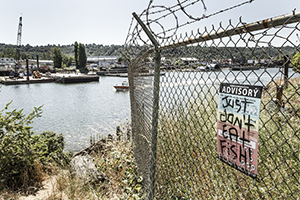A version of this story was originally published in the Summer 2016 UW-SRP e*Bulletin.

Discussions have highlighted the results of recent studies led by Linn Gould, executive director of Just Health Action (JHA). The approach used by JHA aligns with tenants of the ‘Participatory Learning and Action Model’. The JHA studies of subsistence fishers on the Duwamish River addressed concerns regarding the effectiveness of current fish consumption advisories for subsistence fisher populations in the Lower Duwamish Waterway (LDW) Superfund site. The JHA research studies are a collaborative effort that includes essential contributions by Sinang Lee, environmental health educator, and her colleagues in Healthy Communities Planning at Public Health Seattle King County (PHSKC).
In the first study, investigators established a Vietnamese advisory group of community experts and held meetings to discuss contamination issues in the Duwamish River, community values and beliefs related to fishing, as well as alternatives to fishing in the river. Researchers Linn Gould and Khahn Ho (master’s program student in the Community-Oriented Public Health Practice at UW School of Public Health and Vietnamese translator) found that placing information about the river cleanup, fishing, and consuming contaminated fish in Vietnamese newspapers was considered an effective way of reaching the Vietnamese community. Two fishers from the advisory group created a digital story Fishing and Us in Vietnamese, a relatively new technique for disseminating health information. The digital story proposed that meeting at community centers and utilizing members of the Vietnamese community, particularly elders who are knowledgeable and have the time to reach others, as effective ways to “spread the word.” Their research also showed that distributing maps showing the best places to fish around the neighborhoods, in libraries, community centers, in fishing license locations, and at community education events, was seen as an effective way to deliver information. (Slides from the presentation of the study at EPA can be found on the JHA website.)
JHA and PHSKC initiated a second study using similar approaches that was conducted with Latino fishers co-facilitated by Antoinette Angulo and Khanh Ho. Antoinette Angulo is a graduate of the UW School of Public Health and is currently Special Projects Advisor at the UW Latino Center for Health. Several similarities arose from both fisher advisory groups. Both of the advisory groups requested the development of a community advocate (promotores) program to achieve two goals: 1) to inform their own communities about fishing regulations, health, and alternative places to fish; 2) to be the ‘community’s voice.’ One of the most important similarities was the desire to develop interventions that are ongoing and sustainable, since the communities recognize residual contamination will remain in the Duwamish River for up to 40 years.
This fall, JHA will be starting a community advocate program entitled "Building capacity of immigrant fishers to protect their health through education and advocacy" funded by the City of Seattle, Seattle Department of Neighborhoods. The program is a collaborative effort with Washington State Department of Fish and Wildlife (WDFW) staff to develop information resources that better serve immigrant fishers regarding fishing regulations; improve access to fishing sites that are in safe waters; support food security for subsistence fishers and acknowledge the integral cultural value of fishing for these community members. JHA and PHSKC will work with WDFW, Washington State Department of Health, ATSDR, several community health centers, the Duwamish River Cleanup Coalition, and the UW SRP to develop the advocacy program. UW RTC/CEC staff are working with Region 10 EPA and their partners on issues related to fish advisories as part of the Community Involvement Plan for the LDW.

